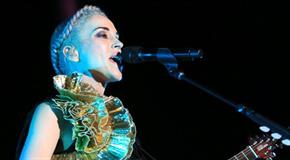Features
St. Vincent Leaps Ahead, Will Tour With Black Keys

“It’s bonkers,” the viewer wrote. “But fascinating, original and strangely addictive.”
St. Vincent, the stage name for singer-songwriter Annie Clark, continues a big year with a full autumn of touring, including a plum slot opening for The Black Keys. Her fourth album, St. Vincent, had her highest Billboard chart debut (No. 12), she played on the season finale of “Saturday Night Live” and filled in for Kurt Cobain at Nirvana’s Rock and Roll Hall of Fame induction. She’s turning heads – not just her own – at concerts.
Clark complements her guitar playing with simple yet odd stage choreography, often in unison with keyboard player Toko Yasuda: head swivels, leverlike arm movements and skittering, birdlike movements across the stage in high heels.
The sense of whimsy most obviously recalls David Byrne. Clark has recorded and toured with the former Talking Heads frontman, and both work with choreographer Annie-B Parson. People who first saw St. Vincent perform on “SNL” were intrigued or bewildered. A small number hated it, Clark said.
“I like a little bit of mischief,” she said.
St. Vincent begins a 14-date U.S. tour Friday in Raleigh, North Carolina, then heads overseas for a punishing 33-date schedule that ends in Lisbon before coming back to the United States to open arena gigs for The Black Keys in December. The big mystery is how fans of the two-piece blues rockers will respond to Clark’s act when the two join forces.

“Devo is one of my favorite bands, and there are things about her show that remind (me) of them in the best possible way,” said Black Keys drummer Patrick Carney. “I am sure the crowds are going to be very into her show. I know when she played ‘SNL’ some people didn’t get it. But when Devo played in 1978 I am sure there were plenty of people totally baffled as well.”
The guitar is what connects the two acts, and Clark said she’ll emphasize it. She can shred, too. “Anyone who has the slightest appreciation for the electric guitar should be able to get into her music,” Carney said.
Clark, 31, grew up in the Dallas area and is now a New Yorker. She studied for three years at the Berklee College of Music in Boston, and played in the choral group Polyphonic Spree and with Sufjan Stevens before striking out on her own.
She has an image, not totally accurate, of being very private. The modern-day habit of people living their lives in public through social media is the subject of her song “Digital Witness,” and clearly that’s not for her. She wants her public exposure to have cultural, not curiosity, value.
“I think that’s been characterized as being private,” she said, “when I’m really just a little picky.”
While the arty, angular music on St. Vincent, where Clark’s guitar sails on a sea of synths, is reminiscent of the 1980s, many of Clark’s musical heroes are rooted in jazz (John Coltrane) or 1990s rock: PJ Harvey, Sonic Youth, Nirvana.
That made it particularly meaningful when the surviving Nirvana members decided to invite some female vocalists, including Clark, to fill in for Cobain at the Rock Hall induction. Her only prior connection to the band was meeting Dave Grohl once at a party. Clark sang “Lithium.”
“It was intimidating in terms of my own affection for Nirvana and wanting to honor the legacy as best I could,” she said. “It’s not often that someone says, ‘Here, fill in for your hero.’ I was struck by how it was really a joyful thing. It was still bittersweet. Everyone wishes that Kurt was still alive.”
At one point during the performance, Grohl looks at her with a wide, admiring smile from behind the drums. Clark never knew; she hasn’t watched it.
“It’s too emotional,” she said.